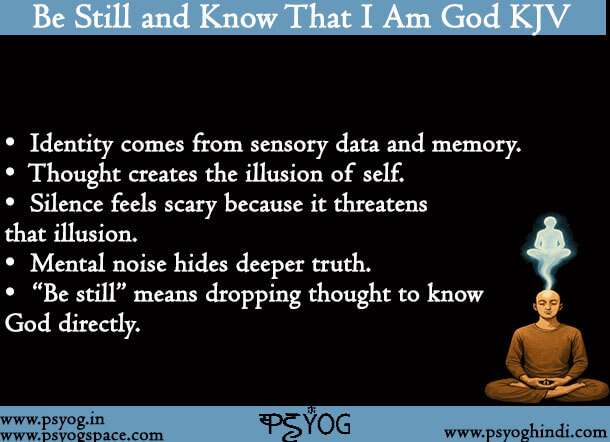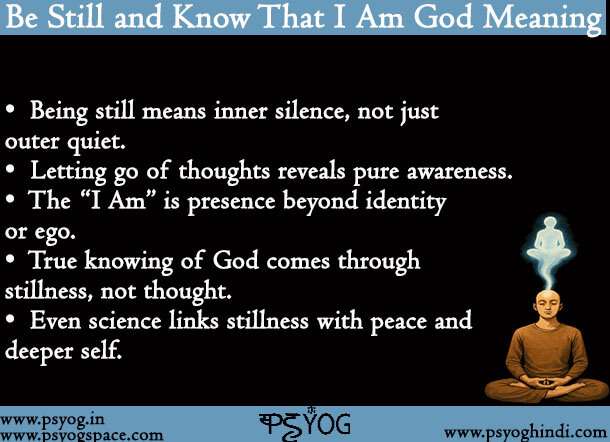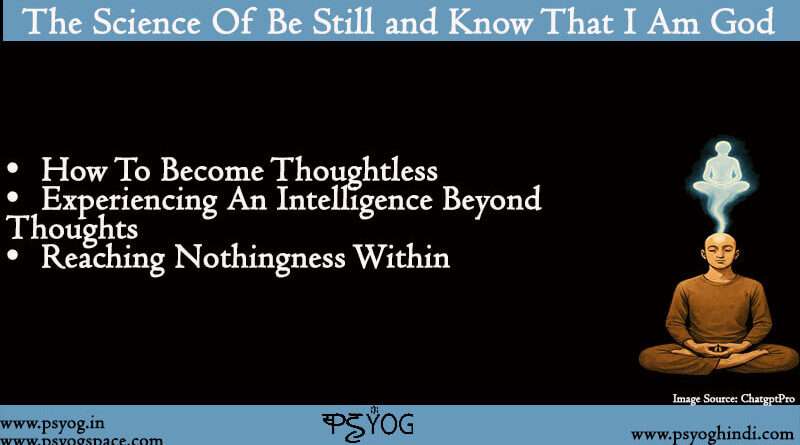Be Still and Know That I Am God: KJV, Meaning, Application and Science
Some words don’t just inform—they stop you. One of those is “Be still and know that I am God.” It’s not loud. It’s not complicated. Yet it carries a weight that can pause your whole inner world. This line, from Psalm 46:10, especially in the KJV (King James Version), offers something deeper than religion. It points to a truth about who we really are—beyond all the noise.
What makes it even more powerful is how it quietly bridges ancient wisdom and modern understanding. Our minds are full, often overloaded. But in this simple sentence lies a kind of map—one that shows how to get beneath the surface, beneath our thoughts, to something still and eternal.
Let’s explore what it truly means to be still and know that I am God, through the lens of the KJV, personal insight, and science.
Be Still and Know That I Am God KJV
Before we can grasp this verse, we need to take a closer look at how we function as human beings. And it starts with a question most people never ask: Where does identity come from?
We tend to assume we are who we are. But the truth is, much of our identity is built through the senses. From birth, our eyes, ears, skin, and other senses collect information. That data enters the mind and forms our memory, which becomes the base layer of who we think we are.
All our thoughts—whether about ourselves, the world, or the future—are shaped by that data. Without information, there’s no content for the mind to process. No thoughts. No story. So in essence, information feeds thought, and thought forms identity. (Read: Do you know that how God talks to us and sees us?
Think about that. If you strip away what you’ve heard, seen, read, and been told—what’s left of “you”?
It becomes easy to see how tightly our identity is tied to thinking. The phrase “I think, therefore I am” makes sense when you realize that so much of what we call “self” is just memory in motion. This is where the verse be still and know that I am God KJV becomes incredibly relevant.
Because once your sense of self is based on thought, stillness becomes scary. Why? Because silence feels like a loss of identity. If you stop thinking, who are you?
That’s the trap. We cling to thought not because we love it, but because we fear what might be under it. And that fear fuels endless mental noise—chatter that never ends.
Yet this very noise is what separates us from deeper truth. When the mind is constantly spinning, there’s no room for stillness. And without stillness, there’s no direct experience of God—only concepts and beliefs.
This is why be still and know that I am God KJV is not just advice. It’s a radical shift. It’s saying: let go of who you think you are. Stop chasing the next thought. Be still—and what’s real will finally show up.

Be Still and Know That I Am God Meaning
Now let’s dive into the meaning of this phrase—not as a verse, but as an experience.
To be still isn’t just about physical silence or quiet time. It’s about inner stillness. That’s much harder. It means not feeding the next thought that pops up. It means noticing the space between your ideas and letting that space widen.
When you manage to do that—even briefly—you start to feel something strange. That constant sense of “me” begins to dissolve. You’re not disappearing; you’re just not clinging. And in that moment, something deeper takes over.
You begin to feel what’s underneath all the noise: pure awareness. It’s not a thought, not a concept. It’s not “you” in the usual way. It’s just… being.
That’s what the meaning of be still and know that I am God points to. The “I Am” isn’t a person. It’s that presence you feel when the thinking stops. It’s untouched by your past, your fears, your identity. It doesn’t need to be proved or defended. It just is.
When the mind quiets, that stillness reveals itself. And it doesn’t feel empty. It feels more real than any thought ever did. That’s what knowing God truly means—not intellectually, but directly, through presence.
Even science is catching up to this. Studies in neuroscience show that deep meditation reduces activity in the brain’s default mode network—linked with self-referential thinking. When that network slows down, people report feelings of peace, unity, and sometimes, divinity.
So yes, be still and know that I am God may come from scripture. But its meaning reaches far beyond religion. It’s an invitation into your truest self.

Conclusion
If you’re always thinking, always reacting, always remembering—you’re not really here. You’re just reliving data. Thoughts are built from memory, and memory isn’t now. It’s yesterday trying to control today.
That’s why the words be still and know that I am God are more than spiritual poetry. They’re a reminder. A way back home. In stillness, your identity loosens. You stop trying to be someone, and you just are. (Read: What makes the human spirit indomitable?)
The KJV version doesn’t add anything fancy. It keeps it pure. Be still. Know. I Am. God. That’s all.
And what’s wild is—you get to choose. Your “I” can be a bundle of memories, emotions, reactions—a psychological mess trying to hold it all together. Or… it can be the stillness beneath it. The awareness that watches but doesn’t cling. That doesn’t come and go.
The more you sit with it, the more it becomes clear: you don’t need to earn peace. You just need to stop running from it.
So let the verse echo inside you—not as theory, but as truth:
Be still and know that I am God.
FAQs
What does it mean to be still and know that I am God?
Be still and know that I am god means a shift of identity from that of the mind, to consciousness. As humans, we create an identification with the content of the mind which drags us to a space of compulsive thinking.
However, when we dis-identify, we become thoughtless and reach a space of nothingness. In that space we transcend human limitations and experience ourselves as consciousness, which is god itself. In a nut shell, this means that our true godly existence is hidden behind thoughts.
When God is telling you to be still?
God is always telling us to be still always. Because we are so occupied with our thoughts hence the world, we lose our connection with the divine. It is true that when we create a state of stillness within, we experience god. Behind our mental chatter, god is waiting. So he always wants us to be still and centered.



